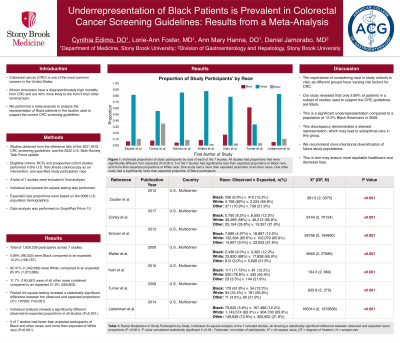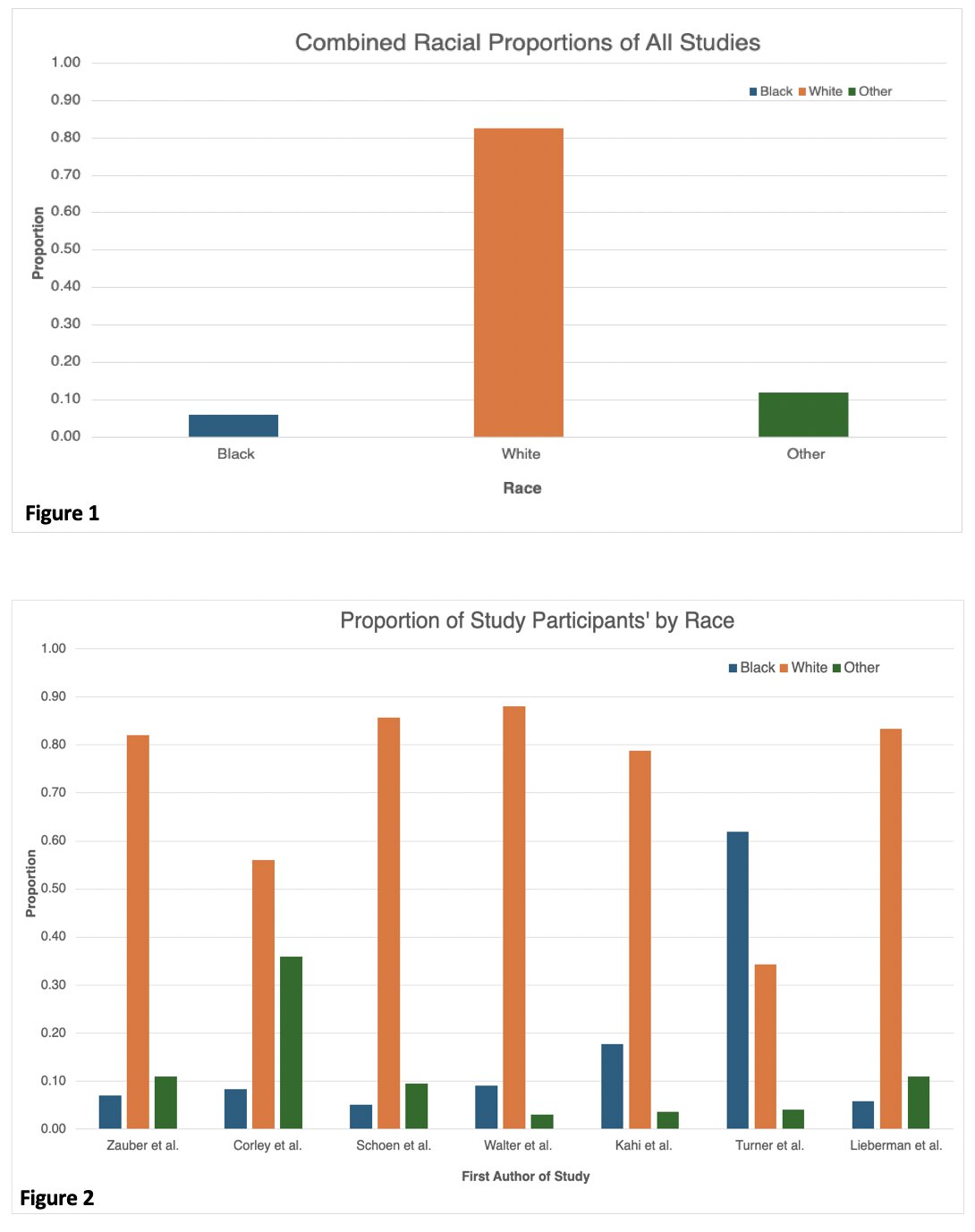Sunday Poster Session
Category: Colorectal Cancer Prevention
P0414 - Underrepresentation of Black Patients Is Prevalent in Colorectal Cancer Screening Guidelines: Results From a Meta-Analysis
Sunday, October 27, 2024
3:30 PM - 7:00 PM ET
Location: Exhibit Hall E

Has Audio

Cynthia Edimo, DO
Stony Brook University Hospital
Stony Brook, NY
Presenting Author(s)
Cynthia Edimo, DO, Lorie-Ann Foster, MD, Ann Mary Hanna, DO, Daniel Jamorabo, MD
Stony Brook University Hospital, Stony Brook, NY
Introduction: Colorectal cancer (CRC) is one of the most common cancers in the United States (U.S.). It is a highly preventable cancer, yet African Americans have disproportionately high incidence and mortality from CRC. We performed a meta-analysis to analyze Black patients’ representation in the studies used to support the current CRC screening guidelines.
Methods: Studies included were obtained from the reference lists of both the 2021 American College of Gastroenterology (ACG) CRC screening guidelines, and the 2022 U.S. Multi-Society Task Force update. Eligibility criteria were randomized control trials and prospective cohort studies performed in the U.S. that utilized colonoscopy as an intervention and that specified study participants’ race. Seven studies were included in the final analysis. Individual and pooled chi-square testing was performed with the expected proportions of each race based on 2006 U.S. population demographics, which was chosen as these data were prior to the oldest study included (2008). Data analysis was done on GraphPad Prism 10.
Results: The studies comprised of 1,629,239 total participants. Of these, 5.89% (96,033) were Black, compared to an expected 12.2% (198,767). We found 82.41% (1,342,639) were White compared to an expected 65.9% (1,073,669). Another 11.7% (190,597) were of all other races combined compared to an expected 21.9% (356,803). Pooled chi-square testing revealed a statistically significant difference between the observed and expected proportions (X2=197930, P< 0.001) (Figure 1). Individual analysis (Table 1) also showed significantly different observed-to-expected proportions in all studies (P< 0.001). Specifically, 5 of 7 studies had fewer than expected participants of Black and other races, and more than expected of Whites (P< 0.001) (Figure 2).
Discussion: The importance of considering race in study participants is vital as different groups have varying risk factors for CRC. Our study reveals that only 5.89% of patients in a subset of studies used to support the CRC guidelines were Black. This is a significant underrepresentation compared to a population of 12.2% of Black Americans in 2006. Screening guidelines supported by studies where Black representation is skewed may lead to suboptimal care in this group. We recommend more intentional recruitment and diversification of future study populations which may ensure more equitable healthcare and decrease bias.

Note: The table for this abstract can be viewed in the ePoster Gallery section of the ACG 2024 ePoster Site or in The American Journal of Gastroenterology's abstract supplement issue, both of which will be available starting October 27, 2024.
Disclosures:
Cynthia Edimo, DO, Lorie-Ann Foster, MD, Ann Mary Hanna, DO, Daniel Jamorabo, MD. P0414 - Underrepresentation of Black Patients Is Prevalent in Colorectal Cancer Screening Guidelines: Results From a Meta-Analysis, ACG 2024 Annual Scientific Meeting Abstracts. Philadelphia, PA: American College of Gastroenterology.
Stony Brook University Hospital, Stony Brook, NY
Introduction: Colorectal cancer (CRC) is one of the most common cancers in the United States (U.S.). It is a highly preventable cancer, yet African Americans have disproportionately high incidence and mortality from CRC. We performed a meta-analysis to analyze Black patients’ representation in the studies used to support the current CRC screening guidelines.
Methods: Studies included were obtained from the reference lists of both the 2021 American College of Gastroenterology (ACG) CRC screening guidelines, and the 2022 U.S. Multi-Society Task Force update. Eligibility criteria were randomized control trials and prospective cohort studies performed in the U.S. that utilized colonoscopy as an intervention and that specified study participants’ race. Seven studies were included in the final analysis. Individual and pooled chi-square testing was performed with the expected proportions of each race based on 2006 U.S. population demographics, which was chosen as these data were prior to the oldest study included (2008). Data analysis was done on GraphPad Prism 10.
Results: The studies comprised of 1,629,239 total participants. Of these, 5.89% (96,033) were Black, compared to an expected 12.2% (198,767). We found 82.41% (1,342,639) were White compared to an expected 65.9% (1,073,669). Another 11.7% (190,597) were of all other races combined compared to an expected 21.9% (356,803). Pooled chi-square testing revealed a statistically significant difference between the observed and expected proportions (X2=197930, P< 0.001) (Figure 1). Individual analysis (Table 1) also showed significantly different observed-to-expected proportions in all studies (P< 0.001). Specifically, 5 of 7 studies had fewer than expected participants of Black and other races, and more than expected of Whites (P< 0.001) (Figure 2).
Discussion: The importance of considering race in study participants is vital as different groups have varying risk factors for CRC. Our study reveals that only 5.89% of patients in a subset of studies used to support the CRC guidelines were Black. This is a significant underrepresentation compared to a population of 12.2% of Black Americans in 2006. Screening guidelines supported by studies where Black representation is skewed may lead to suboptimal care in this group. We recommend more intentional recruitment and diversification of future study populations which may ensure more equitable healthcare and decrease bias.

Figure: Figure 1: Combined proportions of study participants by race across all 7 studies. Studies comprised of 5.89% participants of Black race, 12.2% of White race, and 11.7% of all other racial groups combined. All three proportions were significantly different from expected proportions (P<0.001), with Black and other races underrepresented, and an overrepresentation of White race.
Figure 2: Individual proportions of study participants by race of each of the 7 studies. All studies had statistically significant different proportions from expected (P<0.001). 5 of the 7 studies had significantly less than expected proportions of Black race, and more than expected proportions of White race. One study had a more than expected proportion of all other races. One other study had a significantly more than expected proportion of Black participants.
Figure 2: Individual proportions of study participants by race of each of the 7 studies. All studies had statistically significant different proportions from expected (P<0.001). 5 of the 7 studies had significantly less than expected proportions of Black race, and more than expected proportions of White race. One study had a more than expected proportion of all other races. One other study had a significantly more than expected proportion of Black participants.
Note: The table for this abstract can be viewed in the ePoster Gallery section of the ACG 2024 ePoster Site or in The American Journal of Gastroenterology's abstract supplement issue, both of which will be available starting October 27, 2024.
Disclosures:
Cynthia Edimo indicated no relevant financial relationships.
Lorie-Ann Foster indicated no relevant financial relationships.
Ann Mary Hanna indicated no relevant financial relationships.
Daniel Jamorabo indicated no relevant financial relationships.
Cynthia Edimo, DO, Lorie-Ann Foster, MD, Ann Mary Hanna, DO, Daniel Jamorabo, MD. P0414 - Underrepresentation of Black Patients Is Prevalent in Colorectal Cancer Screening Guidelines: Results From a Meta-Analysis, ACG 2024 Annual Scientific Meeting Abstracts. Philadelphia, PA: American College of Gastroenterology.
